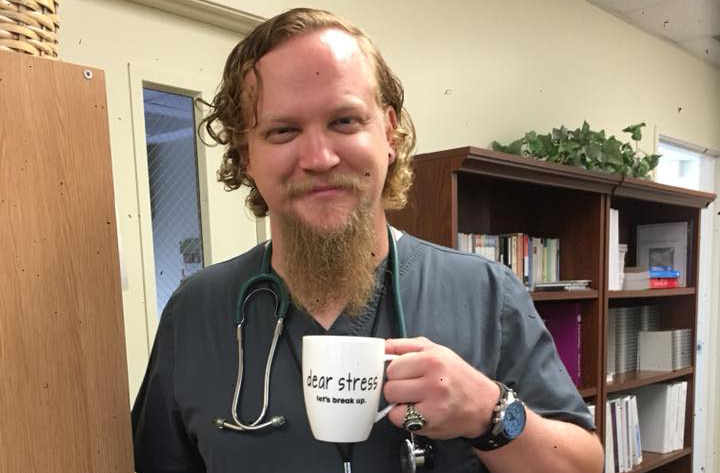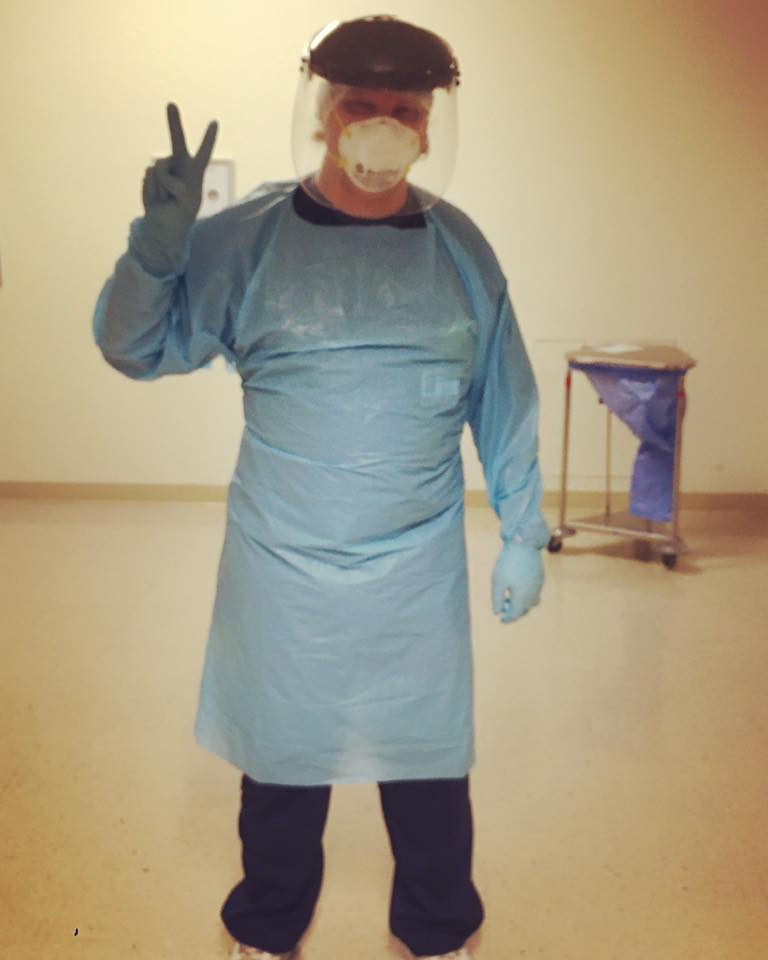5 Questions with ‘Singing Nurse’ Jared Axen

Jared Axen (MS, Nursing, ’20) has been a registered nurse since 2009 and a traveling registered nurse for the last six years, taking temporary three-month contracts and traveling “where the problems are.” In recent years, he continues to attract national attention as the “Singing Nurse” as his patients share stories with the media about how he croons love songs and hymns to them to boost spirits and overall health. His singing and his story have been featured on CBS, NBC, CNN, numerous radio stations around the world, and a few viral online videos. When COVID-19 arrived, he stayed at his current hospital because the need was so great and will soon be working in the movie industry for a company that provides COVID-19 support to help Hollywood return to normal operations.
You have become known as the “Singing Nurse.” How did this get started?
I like to think you are always taking a part of yourself to whatever profession you enter. I’m an artistic person. Music oozes out of me. When I was an undergraduate, I made money cutting grass. I had 33 customers on my lawn route. I became known as the singing gardener. I’ve always been a musician. It’s my personality. It’s so tempting to tell people I’m a nurse when they ask me what I do and start talking about my profession. But I think it’s important to maintain your individuality. When people ask me what I do, I tell them I’m a musician or an artist, but I work as a nurse. One day, I started singing to my patients. It’s just what I do—sing. A few patients told the news about it. The rest is history. I was on The Tonight Show with Jay Leno. I’ve been on Good Morning America. I’ve been on the television show The Doctors. I’ve been interviewed all over America. But I’ve been singing to patients since 2007—long before the media and television found about it. The first time I sang to a patient, I was in college. The patient had just received her cancer diagnosis. I came in singing as I brought her medication. She had been so sad but started smiling right away. That was the moment I knew my singing was therapeutic. Nursing starts at the doorframe.
In one interview, you said your job is to get the patient from the hospital to home, noting that often the patient gets lost and “feels like just a number.” Why do you think singing reminds patients they are human beings?
You know that feeling when you go to the DMV and you take that number and feel like you’ve become one of the cattle? The mentality becomes “Next.” That’s the experience so many hospital patients feel. Suddenly, they’re not in control. When you’re a patient, it becomes so easy to get lost and redefined as a number. I think about how I can make my patients feel like they’re still human beings. My time as a neuro and stroke nurse helped me create this outlook. These patients have a sudden change of status. They’ve lost something—part of their individuality has gone missing. My secondary goal is to help patients find their identity, their humanity, and not lose who they are.
What has the pandemic been like for you?
I remember in March and April, I would message my family and let them know I was working with a COVID-19 patient. I don’t do that anymore. I work a COVID-19 assignment every night. I remember seeing my first patient who had COVID-19. I felt uncertainty and fear. I remember trying to figure out the precaution standards. I’ve worked the first and second waves of COVID-19 but mainly the second wave. I’ve seen so many patients who present with symptoms of bad pneumonia but with acute and chronic effects on the body—something you don’t often see unless the patient is really septic or suffering from burn trauma. Then, as a nurse—as a human—your own emotions enter. You start to think, “What am I bringing home to my family? I could be asymptomatic.” I’ve had horrible nightmares almost every week about me coming down with it and hurting the people I most love. Most of us join nursing because we care and want to help people. The most terrifying thing to learn is that we hurt someone rather than helped them. I didn’t realize how many nurses felt this way until we all started to talk about it. Yeah, we all have nightmares.
What does an average day for you look like?

The professional me is up by 4:15 p.m. I’ve already washed and dried my own personal protection. I’ve got this routine of cleaning my gear and myself right when I get home and before I go to bed. I feel like a soldier folding my parachute. It’s on me to make sure my equipment is all safe and ready to use again the next day. It’s a good detox for me: come home, clean my gear, and shower. This process gives me a mental break from being a professional so I can get back to my personal life. My shoes are left at the front door in a bucket of bleach. Clothes folded inside out and put in the hamper. I then take my gear and inspect it. Nothing changes. Pack it away. Now I can say hello to my wife and dogs and garden. I work three to four shifts and a minimum of 12 hours each. I’d say most of us nurses have PTSD. When COVID-19 patients are really sick, they lay prone for days to help remove fluid in the lungs. Their lungs are so sensitive that the weight of their own heart sitting against the lungs makes it so they can’t breathe. I remember hearing about nurses training themselves to sleep prone. That’s my mentality—I sleep prone now.
What are your plans as we return to “normal?”
What’s normal? I’ve never believed normal means you’re without scars. With stroke and neuro patients, it’s easy to focus on the boulder in the road and not how the journey continues. Normal life is when you can walk around the boulder. It will always be there. I want to make sure I can use my COVID-19 experience and my graduate degree to help others get back to life. As a stroke and neuro nurse, my job is to teach my patients how not to come back. I want to help people get back to normal. I want to help industries learn how to work again. How does normal life continue? By looking at safety and education.
A longer version of this interview was first published as part of the Department of Graduate Studies Fall 2020 newsletter.


